Junior doctors at Sunshine Coast University Hospital are increasingly worried that overwork and fatigue may lead them to make mistakes, according to an annual survey.
However, a Sunshine Coast Hospital and Health Service spokesperson assured it was “dedicated” to supporting junior doctors and would “review the report and consider opportunities for improvement”.
The survey found almost 60 per cent of 719 doctors in training, across Queensland, were more concerned about making a clinical error due to tiredness. The finding is up from 51 per cent last year.
At SCUH, that figure was worse at 61 per cent.
The survey compared the junior doctor experience and staff wellbeing in public hospitals around the state, as part of a Resident Hospital Health Check, which was undertaken by the Australian Medical Association Queensland’s Committee of Doctors in Training and the Australian Salaried Medical Officers’ Federation Queensland.
The CDT chair, Dr Rob Nayer, said the increase in concern about possible fatigue-induced clinical errors highlighted the toll that COVID had taken on the medical profession.
“Every year, more and more doctors in training raise fatigue and overwork as a key concern, and the pandemic has exacerbated the pressure,” he said.
“This year we have seen unprecedented stresses on our hospitals, doctors, and all healthcare workers.
“We know ambulance ramping and access block remain big issues around the state, and it’s really showing a negative impact on the frontline health care providers, which is frequently our junior doctor workforce.
“Doctors, nurses and all healthcare staff are exhausted and now, more than ever, hospitals need to provide a safe, supportive environment for staff.
“We need urgent and sustainable action to train and retain our doctors.”
The state-wide survey also contained questions about the quality of formal and bedside teaching and training, and whether hospitals were doing enough for staff mental health and wellbeing.
Only 38 per cent of respondents (26 per cent at SCUH) were satisfied with their formal training and 25 per cent (27 per cent at SCUH) with their bedside training, while only 39 per cent (28 per cent at SCUH) thought their hospital was looking after mental health and wellbeing adequately.

Dr Nayer believed efforts to improve junior doctor wellbeing and mental health were hampered by heavy workloads and poor rostering.
“Poor training leaves junior doctors feeling unprepared, which affects mental health and contributes to their fear of making mistakes,” he said.
“If we’re not training our doctors properly, we won’t have a future generation of specialists to give Queenslanders the high-quality healthcare they deserve.”
Dr Nayer said a contributing factor to fatigue in Queensland was the excessive amounts of overtime required to just keep up with the demands on our hospitals.
“Worryingly, one in six said they were working up to or more than 24 hours’ overtime per fortnight, and almost one in five did not have an adequate break of 10 hours or more between shifts,” Dr Nayer said.
“These trainee doctors are working exceedingly long hours, often in a very stressful environment, which can leave some vulnerable to anxiety, depression and burnout.
“Burnt out doctors are at high risk of making clinical errors. To give Queenslanders the best health care, doctors need to be rested and able to think clearly.”
The survey highlighted some encouraging improvements at the state level, with a slight drop in the percentage of respondents experiencing bullying, discrimination and/or harassment and a rise in confidence that reported incidents are being appropriately addressed by hospitals.

The Sunshine Coast University Hospital was given an overall grade of C+ in the health check.
The Sunshine Coast Hospital and Health Service spokesperson said: “Sunshine Coast Hospital and Health Service strives to provide a positive workplace culture”.
“We recognise the first few years are crucial to professional and career development and we are committed to making that a positive experience. We believe young doctors are a critical workforce deserving support and development.
“COVID-19 has placed enormous pressure on health systems across Australia and globally and we greatly appreciate our junior doctors who have worked so hard to help us to continue to provide essential health services during this difficult time.
“We know it hasn’t been easy.
“We remain dedicated to providing an organisation that is supportive and provides great work-life balance.
“Our Culture of Care program has been embedded throughout the health service and this year saw the implementation of a dedicated wellbeing program to support our staff in partnership with our health foundation, Wishlist, and the University of the Sunshine Coast’s Thompson Institute.
“We have multiple feedback mechanisms in place to hear from our staff, including our resident medical officers, but we are always open to additional feedback and will carefully review this report and consider opportunities for improvement.
“However, the community can take comfort in the fact we are providing great patient care and we take action when it comes to inappropriate workplace behaviour. We have zero tolerance for bullying and workplace harassment at the SCHHS.
“We pride ourselves on being an organisation that not only states we value our staff but consistently demonstrates that commitment by action.”
SCUH gradings
(2022 Resident Health Check, by Australian Medical Association and its Council of Doctors in Training, in collaboration with the Australian Salaried Medical Officers’ Federation Queensland).
- Access to annual leave: B-
- Career progression and development: C
- Hours of work and overtime: A-
- Wellbeing and workplace culture: C
- Bullying, discrimination and sexual harassment: C
- Overall grade: C+
SUBSCRIBE here now for our FREE news feed, direct to your inbox daily!





